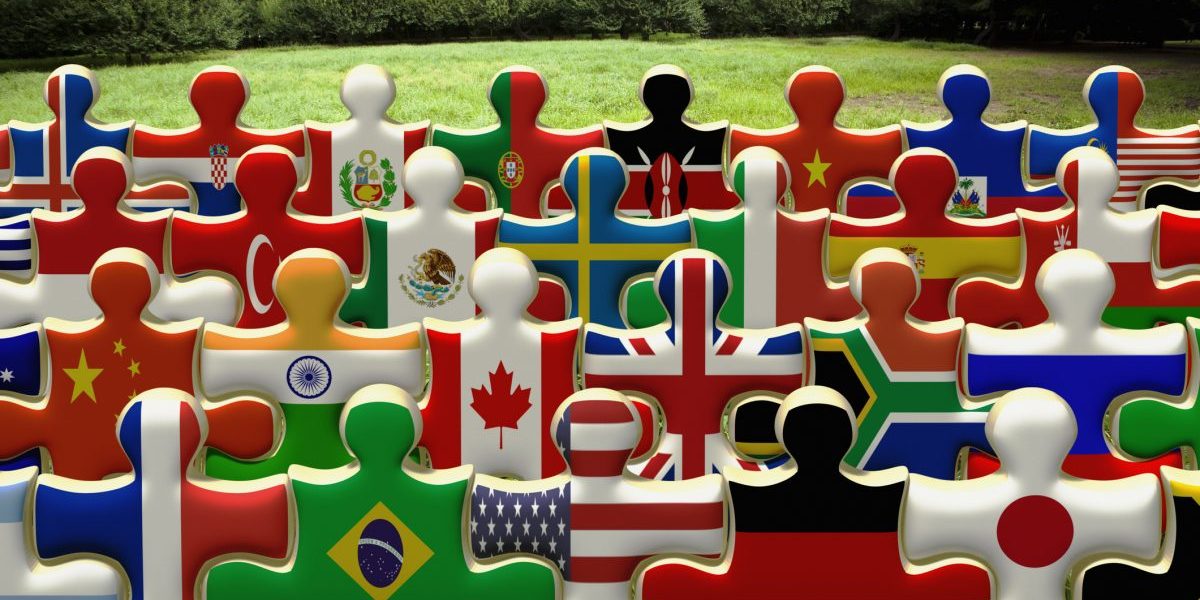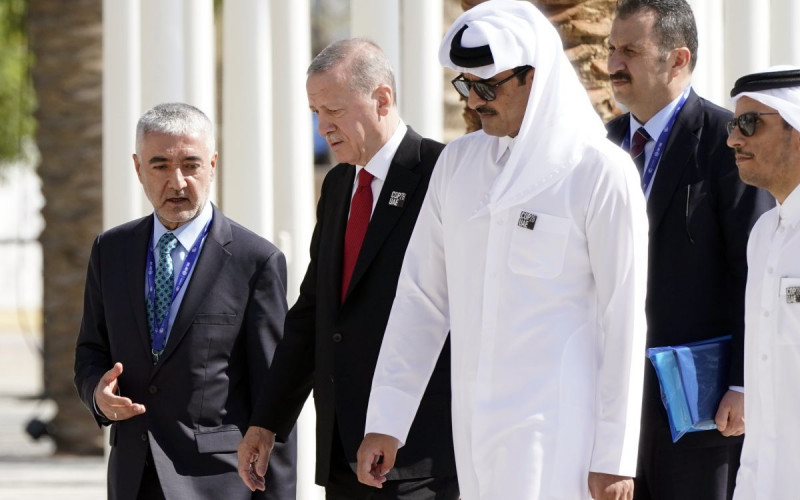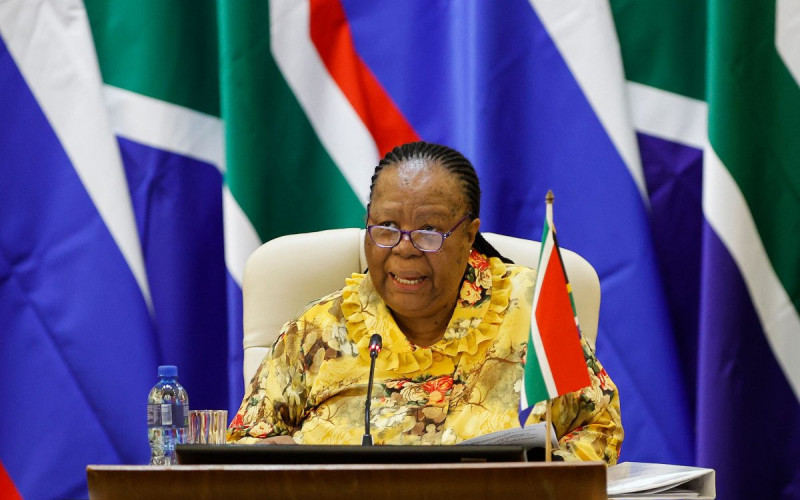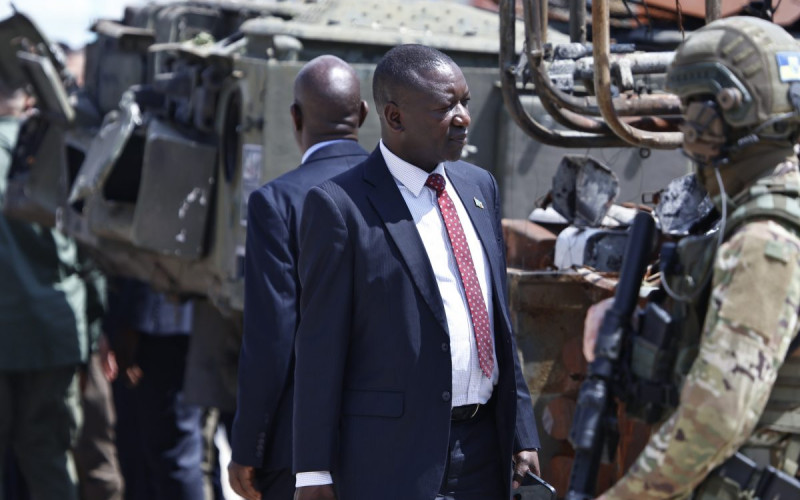The present global world order
‘Nothing is built on stone; all is built on sand, but we must build as if the sand were stone’, Jorge Luis Borges, Argentine poet.
This quotation aptly describes the present global world order, which can best be characterised as a ‘Strategic Alliance Global Order’. This concept can help to make sense of present developments and the evolving international system, and in developing a strategic response.
The present world order, as it evolves, is as multifaceted as it is complex. Influence is diffused, with an emerging quadrilateral power rivalry in different configurations and alliances (US, EU, China, Russia). This does not exclude other possible rising rivals from organisations or other emerging powers (creating a two-tier system). The present world order has a definite non-hegemonic power dynamic. It is also marked by a schism between democracies and autocracies; there is a divide on adherence to an international rules-based system and a north/south historical dynamic.
The US’s National Intelligence Council in its Global Trends report for 2012 had already posited that: ‘The shift in national power … may be overshadowed by an even more fundamental shift in the nature of power. By 2030, no country — whether the US, China or any other large country — will be a hegemonic power’.1National Intelligence Council, Global Trends 2040: Alternative Worlds, 6th ed. (2012), 25
Its most recent report in 2019 reinforced this perspective, stating that: ‘No single state is likely to be positioned to dominate across all regions or domains, opening the door for a broader range of actors to advance their interests.’2National Intelligence Council, Global Trends 2030: A Contested World, 7th ed. (2021), 90
Defining the Strategic Alliance Global World Order
The ‘Strategic Alliance Global Order’ can be defined by the absence of absolute, dominant power by any individual country, and therefore the need, especially by major states, to counterbalance other aspirant states within the specific context of a non-hegemonic global environment. How this competition or cooperation plays out will become a critical issue.
As a result, countries start to scramble to restructure and build new alliances, as energy supplies, global value chains and national security interests are threatened. Principles are sometimes sacrificed at the altar of realpolitik, as a means of survival. Old allies become new enemies while old enemies become new allies. Military budgets grow and joint exercises are conducted with traditional partners but also with new potential allies, in anticipation of an increased military threat.
For countries to compensate for the deficit of power and to maintain influence, a drastic shift away from unilateralism is necessitated and an even more drastic move towards strategic alliances will be required. This pattern will become the new dominant approach in international relations, giving rise to strategic alliances. The focus on building and maintaining such alliances will become critical, not only for national and foreign policy interests, but also for the global balance of power. The ‘Strategic Alliance Global Order’3Dean Elmuti and Yunus Kathwala, ‘An overview of strategic alliances,’ Management Decision 39, no.3 (2001): 205-217 is thus born and in motion.
The US, EU, Russia and China – the dominant players at present – will continue to expand their spheres of alliance by courting countries across the globe. Of special attention will be Latin America, Africa, Asia and the Pacific and in some cases parts of Europe. Major powers will also place emphasis on “traditional middle powers and emerging middle powers” that are able to exercise regional and global influence.4Eduard Jordaan, ‘The Concept of a Middle Power in International Relations: Distinguishing between Emerging and Traditional Middle Powers,’ Politikon: South African Journal of Political Studies 30, no.1 (2003): 165-181
In this regard, the Ukraine war has turbo-charged the ‘Strategic Alliance World Order,’ which had already begun at the end of the 20th century, as the old-world order with its own characteristics started to erode. Joseph Borrell, High Representative of the European Union for Foreign Affairs and Security Policy, alluded to this in March 2022 just after the Ukraine war started: ‘Crises tend to crystallise developments and this one has made it even clearer that we live in a world shaped by raw power politics, where everything is weaponised and where we face a fierce battle of narratives. All these trends were already happening before the Ukraine war; now they are accelerating’, he wrote.
Implications for diplomatic engagements
The central argument of this paper is that there is an important new development that goes beyond the traditional reasons for bilateral and international engagement that is infusing the international because of the ‘Strategic Alliance Global Order’. This new power dynamic calls for a different approach by both powerful and less powerful countries in their engagement with one another.
We are likely to see both moribund and new partnerships resurrected or mooted; summits will be hosted, and cooperative approaches advanced, as present non-hegemonic dominant countries as well as middle and emerging powers seek to build alliances based on common values and mutual benefits or driven by realpolitik. Countries will also use mechanisms such as soft power more, through an increase in financial aid, enhanced trade cooperation, investment initiatives, military and political cooperation. Because the focus will be on regions that hold the best opportunities for sharing common interests, the benefits of soft power could flow in that direction at the expense of others. Countries will also use extensive social media campaigns to highlight the benefits of their actions, whether actual or anticipated.
It is therefore critical that in such a diplomatic dance, major powers need to understand that it cannot be business as usual. Less powerful countries need to understand that this new power dynamic creates opportunities for a more even-handed way of engagement.
As perfectly described in an article in the Financial Times by Ivan Krastev on the influence of middle powers, ‘…they all share one fundamental feature: they are all determined to be at the table and not on the menu, since they all have the power and ambition to shape their regions’.5Ivan Krastev, ’Middle Powers are reshaping geopolitics,’ Financial Times, November 18, 2022, https://www.ft.com/content/0129492d-ac7f-4807-8050-2760a09e9ccc
Not adapting to this model, where the margin for error is exceedingly small and the stakes are high, is to risk threatening the very goal of winning over a potential partner and losing the balance of power in favour of other strong nations. In the case of less powerful countries, it may mean giving up on important gains. Bilateral, regional, mini lateral6Arrangements where smaller groups of countries collaborate on a specific issue. and multilateral negotiations in the pursuit of establishing and strengthening partnerships will therefore need to be for the mutual benefit of all parties.
International relations will have to focus on building strategic alliances, which can be activated via bilateral relations, regional groupings or minilateral configurations. In pursuit of building alliances, bilateral relations may be intensified through an increase in diplomatic engagements and the arrangement of structured mechanisms such as binational commissions and dialogue forums. Regional groupings will grow as countries seek security and relevance, and to exert their regional influence. Minilateralism as an alternative form of collective action will also become more prevalent in building alliances and solving disputes, beyond just military cooperation and include cooperation designed to assist with creating a forum to broadly advance regional interests.7Editorial Board, ‘Different kind of Asia Pacific minilateralism is now needed,’ East Asia Forum, February 20, 2023, https://www.eastasiaforum.org/2023/02/20/a-different-kind-of-asia-pacific-minilateralism-is-now-needed/#:~:text=A%20different%20kind%20of%20Asia%20Pacific%20minilateralism%20is,of%20re-energising%20Asia%20Pacific%20regionalism%20an%20urgent%20priority
Therefore, it is not incomprehensible that while bilateral and multilateral diplomacy will continue to be used, minilateralism may become the main mechanism to resolve most of the world’s most pressing challenges (such as the Ukraine war) due to its more focused and less bureaucratic character. This prominence is also reflected in groupings like the G20, G7 and BRICS.8Stewart Patrick, ‘The New “New Multilateralism”: Minilateral Cooperation, but at What Cost?,’ Global Summitry 1, no.2 (2015): 119-121 Minilateralism will grow in importance, especially in areas where multilateralism has been unable to resolve problems.
The rise of alliances
The jostling for influence by major powers, in order to build alliances, has resulted in less dominant countries reflecting on how best to adapt their foreign policies. The concern is that to choose sides will mean the loss of opportunity to maintain control over foreign policy choices that would be in their national interests.
In regions such as Latin America and the Caribbean, where major powers have competed to bring countries into their sphere of influence in the past, many are seeking an alternative policy strategy to choosing sides. In their book Latin American Foreign Policies in the New World Order: The Active Non-Alignment Option, former Chilean Ambassador and Minister Jorge Heine and political scientists Carlos Fortin and Carlos Ominami argue that Latin America and the Caribbean must avoid being caught between China and the US.9Carlos Fortin, Jorge Heine and Carlos Ominami, Latin America Between a Rock and a Hard Place: A Second Cold War and the Active Non-Alignment Option, Global Policy, October 2, 2022, https://www.globalpolicyjournal.com/blog/02/10/2020/latin-america-between-rock-and-hard-place-second-cold-war-and-active-non-alignment
Academic Juan Tokatlian argues that ‘one can realize that the vast majority of Latin American countries are already searching for a more balanced foreign policy: a complex equilibrium in exceedingly difficult international circumstances. A diplomacy that seeks an equidistant position.’10Juan Gabriel Tokatlian, ‘Latin America Does not want a New Cold War,’ Americas Quarterly, April 28, 2022, https://americasquarterly.org/article/latin-america-doesnt-want-a-new-cold-war/
In a major foreign policy speech, British Foreign Secretary James Cleverly in referring to Britain’s future foreign policy strategy, alluded to the concepts that have been posited in the “Strategic Alliance Global Order”. He stated that: “[We] will make a long term and sustained effort to revive old friendships and build new ones, reaching far beyond our long-established alliances”.11Government of the United Kingdom, ‘Multilateral reform: Foreign Secretary’s speech at Chatham House London Conference 2023,’ Government of the UK, June 29, 2023, https://www.gov.uk/government/speeches/multilateral-reform-foreign-secretarys-speech-29-june-2023 For the UK in a post-Brexit era which is geopolitically fraught, and without belonging to the European Union as a powerful bloc, adapting, designing, and creating a “new” foreign relations paradigm will require an ever more strategic approach, which encapsulates the present power dynamics in international relations.
Arrangements that embrace both soft and hard power, such as the EU’s, will expand as emergent powers attempt to project influence through regional blocs. This view has been vindicated by data showing that support for leaving has dropped significantly in EU countries with 72% viewing the EU favourably compared to 26% who viewed it unfavourably, while countries in the Western Balkans and Eastern Partnership who are not members are also clamouring to join.12Jon Henley, ‘Support for Leaving EU has fallen significantly across bloc since Brexit,’ The Guardian, January 12, 2023, https://www.theguardian.com/world/2023/jan/12/support-for-leaving-eu-has-fallen-significantly-across-bloc-since-brexit In the UK, opinion polls show that support for Brexit is at 33% with 55% indicating that it was wrong to leave.13Statista Research Department, ‘Share of people who think Brexit was the right or wrong decision’, September 28, 2023, https://www.statista.com/statistics/987347/brexit-opinion-poll/ The Ukraine war will further accelerate this trend as in times of global uncertainty being part of a bloc provides strength in numbers and structure. The EU will continue to grow in geopolitical importance after a challenging period when hope in the EU project was floundering. The approval of “A Strategic Compass” action plan by the EU to strengthen its security and defence policy by 2030 is an attempt to compensate for the absence of hard power.
German Chancellor Olaf Scholz in an address in Prague in August 2022 emphasised that the EU would invest in new partnerships – in Asia, Africa and Latin America. Political and economic diversification is, incidentally, also part of the answer to the question as to how we deal with the superpower China and the triad of ‘partner, competitor and rival’. Scholz added that the EU would also ‘make itself ’fit’ for future enlargement’.14Federal Republic of Germany, ‘Speech by Federal Chancellor Olaf Scholz at the Charles University in Prague on Monday, 29 August 2022,’ Press and Information Office of the Federal Government, August 29, 2022, https://www.bundesregierung.de/breg-en/news/scholz-speech-prague-charles-university-2080752 In this respect, the EU will continue to reorganise, overcoming the hesitancy of the objectives it set out, to strive to become an important European and global force, whose focus will turn increasingly to matters of geopolitics and the use of hard power.15Borrell, ‘Europe in the Interregnum’
This development will be positive for regional powers like South Africa which form part of a select group of countries that have a strategic partnership with the EU. It will also be positive for Africa in the form of the Africa-EU Strategic Partnership. A strong opportunity thus exists for South Africa and Africa to negotiate for better outcomes as important regional powers and continents are being lobbied intensely by blocs like the EU. The EU believes that it must continue to build solid alliances with partners in Africa ‘[i]n order to preserve its own economic and security interests in the face of increased geopolitical competition’.16Eric Pichon, ‘Understanding the EU’s approach to a new partnership with Africa,’ European Parliament, February 2022, https://www.europarl.europa.eu/RegData/etudes/BRIE/2022/698905/EPRS_BRI(2022)698905_EN.pdf
A new ‘European political community’ was also inaugurated at a meeting in October 2022 as an informal intergovernmental gathering of both EU and non-EU countries sharing common values. Its purpose is to foster cooperation on issues of common interest, revolving around peace and security, the economic situation, energy and climate and migration and mobility.17European Parliament, Think Tank, Outcome of the European Political Community and European Council meetings in Prague on 6-7 October 2022 (Prague: European Parliament:2022), 1, https://www.europarl.europa.eu/thinktank/en/document/EPRS_BRI(2022)734671
The pursuit of alliance-building across the world is also reflected in the number of high-level diplomatic visits, the establishment of military alliances, the strengthening of economic linkages through endeavours such as China’s Belt and Road Initiative or the US/G7 Partnership for Global Infrastructure and Investments, as well the signing of bilateral and regional trade agreements. We can also observe a similar pattern in the Pacific Islands with the ‘Friends to All’ strategy that these islands are employing as a way of mitigating geostrategic competition.18Ralph Regenavu and Dame Meg Taylor, ‘’Opening Remarks’’ in The China Alternative: Changing regional order in the Pacific Islands, ed. Graeme Smith and Terence Wesley-Smith (Vanuatu: University of South Pacific, 2019), 1. The recent overtures by China in this region, and the first-ever US-Pacific Island Country Summit on 29 September 2022, highlight this point.19White House Briefing Room, Fact sheet: Roadmap for a 21st-Century U.S.-Pacific Island Partnership, September 2022
Countries use both formal and more informal regional trading blocs and groupings to expand their influence, such as the EU, or Eurasian Economic Union championed by Russia, and the Regional Comprehensive Economic Partnership, (or RCEP) led by China. The Comprehensive and Progressive Agreement for Transpacific Partnership, (or CPTPP) is also being prioritised as a similar organisation that can advance the interests of members who belong to a powerful trade bloc. In this regard it has also attracted the attention of countries outside the Asia-Pacific bloc like the UK which joined recently.20UK Department of International Trade, UK Accession to CPTPP: The UK’ Strategic Approach (UKDIT: 2021), 5.
The initial TPP proposed by the US was intended to build partnerships with countries in the Pacific to counter China’s growing economic strength. The Trump administration’s decision to withdraw from the negotiations, however, did not stop the rest of the grouping from proceeding. Informal trade groups that are being utilised to build influence are the US-led initiative in the form of the Indo-Pacific Framework launched in 2022 and the Russian-led Eastern Economic Forum.
In vying for influence, China and Russia are likely to place greater importance on groupings such as the BRICS as a Southern counterbalance to the North. In 2022 a number of countries from the Global South indicated their interest in joining the BRICS and at the 2022 summit a decision was taken to consider the modalities and principles of such an expansion.21Antara Ghosal Singh, ‘Why China wants to expand BRICS,’ The Observer Research Foundation, July 21, 2022, https://www.orfonline.org/expert-speak/why-china-wants-to-expand-brics/ At the August 2023 BRICS Summit in Johannesburg, six countries – Argentina, Egypt, Ethiopia, Iran, Saudi Arabia and the United Arab Emirates – were invited to join the organisation from 1 January 2024. Over 40 countries had expressed some interest in joining BRICS, and over 20 formally applied. The creation of an alternative economic architecture will drive the expansion,22Lord O’Neill of Gatley, ‘The future of BRICS and the New Development Bank’ (Global Policy: 2023), 1-6, https://doi.org/10.1111/1758-5899.13195 as will the new and uncertain global order. There is a possibility that with no country claiming to be a singular superpower, China and Russia – the more powerful countries – could become more amenable to the interests of the group.
Formal military-based alliances like NATO are also drawing more candidates, with many countries in Europe opting to now join the security umbrella. In 2019, NATO was being criticised for being ‘brain dead’ by French President Emmanuel Macron, for lacking direction.23‘Emmanuel Macron in his own words,’ The Economist, November 7, 2019, https://www.economist.com/europe/2019/11/07/emmanuel-macron-in-his-own-words-english Now, in the wake of the war in Ukraine, even avowedly neutral countries such as Sweden and Finland that once would not have contemplated such a move applied to join. Finland joined in April 2023 and Sweden may join during the course of 2023. The Ukraine war has acted as a catalyst for a closer alliance between the US and Europe.
There will also be countries that are looking to build alliances across different blocs, so as to have wider influence. In this regard India now belongs to different alliances representing the global divide such as BRICS, East Asia Summit, the Asian Regional Forum, the Quadrilateral Security Dialogue (the Quad), and the Shanghai Cooperation Organisation, or SCO). In order to expand its influence in Asia, the US is also relying on minilateral groups such as the “Quad” grouping consisting of the US, Australia, India and Japan as well as the AUKUS, the trilateral security agreement between Australia, the UK and the United States.24Bart Gaens, ‘The US is refocusing its foreign policy priorities on the Indo-Pacific recalibrating alliance politics in a pivotal region,’ The Finish Institute of International Affairs, September 14, 2021, https://www.fiia.fi/wp-content/uploads/2021/09/comment14_the-us-is-refocusing-its-foreign-policy-priorities-on-the-indo-pacific_bart-gaens-3.pdf
Importantly, countries are also acting from a genuine need for mutual bilateral and international cooperation. They do indeed support each other on common global challenges. Cooperation has covered many areas, such as on pandemics, peace and security, climate change and the financial crisis among others. COVID-19 was an excellent example of the global community cooperating to act in the best interests of humanity, although more could have been done for developing and least developed countries to have both access to vaccines and to allow for relaxation of patent rules required for the productions and supply of vaccines.25World Trade Organisation, Ministerial Declaration on the Trips Agreement, WT/ MIN (22)/ 30WT /L /1441, 22, https://docs.wto.org/dol2fe/Pages/FE_Search/FE_S_S009-DP.aspx?CatalogueIdList=285740&CurrentCatalogueIdIndex=0
Affluent countries also provide critical resources, supporting domestic priorities and providing development cooperation, for the upliftment of less prosperous states. Countries also strive to enhance trade and investment, while regional groupings provide a platform and mechanisms to deal with critical regional and global issues. This aspect of international relations cannot be underestimated, as it provides a framework for a more cooperative future world order.
Strategic planning as a foreign policy tool in the ‘Strategic Alliance Global Order’
In the 21st century, international relations are continuously shifting, making the execution of statecraft which ‘includes the construction of strategies for securing national and global interests as well as the execution of these strategies by diplomats’ more difficult to manage.26Morton A. Kaplan, ‘An introduction to the strategy of statecraft,’ World Politics 4, no.4 (1952): 548, https://www.jstor.org/stable/2008966 This also requires the application of statecraft that is able to deliver a strategy that provides for the best outcomes.
As a result of the complexity of the geopolitical environment, multi-goal strategic thinking must become more dominant. Countries that continue to focus on ‘one-track’ strategies and unilateral or unilinear statecraft are likely to fail.27Jochen Prant and Evelyn Goh, ‘Rethinking strategy and statecraft for the twenty-first century of complexity: a case for strategic diplomacy,’ International Affairs 98, no.2 (2022): 443-469
By creating a paradigm based on identifying certain key developments around the ‘Strategic Alliance World Order,’ outlined above, policy makers and key strategists will be able to better anticipate and understand specific events, and then create a strategy to cope with multiple scenarios and the implications thereof.
An effective player on the international stage will therefore be cognisant of the fact, that in the present world order, the pursuit of national and global interests will have to be balanced with anticipating the fluid changes in the building of alliances, and how they impact on relations with different countries and groupings.
This will also require a high-level foreign policy strategic thinking, and the presence of highly qualified, trained, and professional diplomats practising the art of statecraft in a complicated and shifting and evolving international relations environment. Over 70 years ago, Morgenthau was arguing that ‘Diplomacy of high quality will bring the ends and means of foreign policy into harmony with available resources of national power. It will tap the hidden sources of national strength and transform them fully and securely into political realities.’28Hans Morgenthau, ‘Politics among Nations: The Struggle for War and Peace,’ (New York: 1948), 105
South Africa’s Minister of International Relations and Cooperation, Dr Naledi Pandor, succinctly outlined what is required in the present global order in a statement made in the Department of International Relations and Cooperation (DIRCO) Strategic Plan 2020-2025:‘This requires a set of strategies that position the country to effectively engage in global politics, trade and development with the requisite capabilities to manage multi-layered relations within the global political and economic architecture’.29Republic of South Africa, Department of International Relations, Executive Authority Statement, Department of International Relations Strategic Plan, 2020-2025, 4
Strategic decisions taken based on foreign policy principles, should therefore be a careful process of considering actions and consequences, as opposed to a one-size-fits-all solution. The late former US Secretary of State Madeleine Albright said, ‘A lot of people think international relations is like a game of chess. But it is not a game of chess, where people sit quietly, thinking out their strategy, taking their time between moves. It is more like a game of billiards, with a bunch of balls clustered together’.30Madeleine K. Albright, The Third Seminar on NATO’S Strategic Concept, North Atlantic Treaty Organisation, January 14, 2010, https://www.nato.int/cps/en/natolive/events_60524.htm
Statistician Nassim Taleb, in his essay, ‘The Black Swan: The Power of the Unpredictable’ describes a ‘black swan event’ as a certain unpredictable event that has a low probability of occurring and which, if it occurs, has far-reaching and exceptional consequences.31Nassim Nicholas Taleb, ‘The Black Swan: The Impact of the Highly Improbable,’ Academy of Management Perspectives 25, no. 2 (2010): 480
The Ukraine war is such a ‘black swan’ moment that led to the UN General Assembly (which has only held 10 emergency sessions since 1950) to call such a session after the Russian invasion of Ukraine in February 2022 because the UN Security Council had failed to exercise its primary responsibility of maintaining international peace and security in line with the adoption of resolution 377A(V), widely known as ‘Uniting for Peace’.32UN General Assembly, Resolution 377 A(V), which calls for the General Assembly to act on a matter due to the Security Council failing to exercise its primary responsibility for the maintenance of international peace and security, https://research.un.org/en/docs/ga/quick/emergency As a result of a black swan event, policy choices and consequences become much more complex and the need to undertake strategic planning becomes imperative. In a ‘Strategic Alliance Global Order,’ choices made will have to consider the implications for bilateral relations as alliances are built around common interests and threats.
A decision by individual nations on the Ukraine resolution of March 2022 would have meant a strategic assessment of the different options. In this respect nations would have needed to determine why they are opposing, abstaining or supporting the above-mentioned resolution. In doing so they would have had to consider the following:
Firstly, states will have considered what are the concomitant implications of each position taken for bilateral, regional, and global relations as well as the multilateral order in terms of the promotion of global peace and security.
Secondly, they will have considered the practical reality and how it will impact on developments on the ground in terms of the position taken. This would include considering whether an attempt at peace at that moment would have been possible considering the state of play between the parties, or would it need to be preceded by a war of attrition; or would peace attempts without substantial support in the widest possible terms mean military defeat and conceding of territory by one party?
Thirdly, nations will have needed to assess why they should abstain at such a moment of history where there had been a clear violation of national sovereignty of a member state and the principles of international law, falling into the category of jus cogens (compelling law)? What persuasive arguments and actions could be made for such an approach?
Fourthly, is an abstention vote to be considered by taking a position of political non-alignment or one of political alignment based on solidarity alliances and national interest? Many in the Global South have viewed the UNGA resolution as an initiative of the Global North against countries of the Global South and supported by countries with a colonial and anti-liberation past. This approach will not give precedence to the immediate legal arguments of the present conflict nor necessarily negate the moral one, as it is based on subjective reasoning.
The German Foreign Minister Annalena Baerbock in analysing the outcome of the vote, alluded to this fact by stating during an address to her ambassadors that; “While 141 countries condemned Russia’s invasion more than half of the global population did not vote with us… to understand why, when there is a choice between right and wrong, between victims and perpetrators, a country would simply abstain”.33Federal Republic of Germany, Federal Foreign Office, Keynote address by Foreign Minister Annalena Baerbock at the 20th Ambassadors Conference, September 5, 2022, https://www.auswaertiges-amt.de/en/newsroom/news/boko-2022/2550006
On the other hand, Dr Subrahmanyam Jaishankar, India’s External Affairs Minister, said in a media interview at the GLOBESEC 2022 Bratislava Forum on 3 June 2022, that; ‘Europe has to grow out of the mindset that its problems are the world’s problems, but the world’s problems aren’t Europe’s problems.’34‘EAM S Jaishankar on why Europe’s perspective of world’s problems is flawed,’ Economic Times of India, June 3, 2022, https://economictimes.indiatimes.com/news/india/watch-eam-s-jaishankar-on-why-europes-perspective-of-worlds-problems-is-flawed/videoshow/91986100.cms
A good strategy will therefore highlight the myriad of options that should be considered, the reasons for accepting or rejecting them, how they should be applied and most importantly the geopolitical context within which these are being undertaken. In today’s digital world the effectiveness of the communication strategy also will need to be examined. This is based on the dictum of ‘influencing the space and informing the narrative’ which continues to be a vital part in any foreign policy position and strategy.
While it is imperative that conflicts or major events around the world should be examined fairly, it is still trite that not all conflicts and events are the same in terms of geopolitical implications. The guiding light should be the application of international rules and principles and actions that are not contra bonos mores (against good morals).
Countries’ actions are driven by national interests, collective global interests, international law and rules-based interests or process-driven interests (a different process or procedure could result in a better outcome), or a combination of these. Process-driven interests may sometimes be a form of obfuscation to make national interests more palatable in decision-making. In the context of international relations, countries need to ensure that they are on the right side of history or within the context of this analysis on the side of a rules- and law-based ‘Strategic Alliance Global Order’.
Way forward
At this historical juncture, with the ‘Strategic Alliance Global Order’ in motion, multiple alliances will need to be built. This is a consequence of the absence of absolute power and the need to compensate for the power deficit of powerful nations. In this regard, less powerful countries also have the opportunity of participating in such alliances from a position of strength. It is possible that the need for and the creation of multiple alliances may result in the gradual erosion of the silo mentality and gradually push the global community towards a greater spirit of cooperation with its concomitant benefits both nationally and internationally.
While not apparent on the surface, a secure global world order will become the raison d’etre for breaking down barriers between nations and groupings, as the negative impact of a present fractured world order becomes unsustainable.35Paul Tucker, ‘Global Discord: Values and Power in a fractured World Order,’ Global Governance Institute (2022), 115
A zeitenwende (an epochal tectonic shift moment for humanity), to borrow the German phrase from the speech made by the German Chancellor to the Bundestag on 27 February 2022, is taking hold. A positive outcome of these shifts is that the ‘Strategic Alliance Global Order’ may lead to the breakdown of barriers, as countries and the global community become even more dependent on each other and specifically on countries that play by the rules for the maintenance and preservation of security, economic prosperity and stability of the global order. While it may not be apparent as the world seems increasingly divided, one should not lose sight of a world that is committed to international cooperation. This was seen in the March 2022 vote for the UN resolution on the war in Ukraine which blurred the global divisions and did not fit into neat compartments. The vote patterns reflected an overwhelming support for an international rules-based system.36UN General Assembly, Resolution 11/1, Aggression Against Ukraine, A/RES/ES-11/1 (Mar. 2, 2022), https://research.un.org/en/docs/ga/quick/emergency
This approach, it should be stressed, does not negate both the historical as well as the unique developmental challenges of the world. Importantly, a focus of the global community should be on finding sustainable solutions that revolve around common values and are focus ed on our common humanity.
As a corollary of a future global order the following are the sine qua non for global harmony. namely, robust systems and structures that underpin global institutions, constitutionalism; independent judiciary; democracy, freedom, rule of law, human rights; international cooperation and solidarity; adherence to international law, economic inclusivity; respect for diversity; gender equality; environmentalism; a vociferous civil society and media and ‘moderation in global affairs’.37Francis Fukuyama, Liberalism and its Discontents, (London: 2022), 154
Conclusion
Reflecting on Gramsci’s ‘interregnum’ between the old which is dying and the new that has not been born yet, the state of flux in the international order may see countries forming opposing alliances that may lead to greater conflict and tension. But the opposite also holds true, that states may see that it is in their strategic interests to promote a more stable, cooperative and peaceful global order.
In fact, if states articulate their displeasure against countries that seek to create disorder by using various diplomatic mechanisms, this may serve as a strong deterrent. States may also remain ambivalent towards other states adapting to the prevailing currents.38Vera Kranenburg and Ties Dams, ‘China is divided on Russia-let’s keep it that way,’ Clingendael, September 15, 2022, https://www.clingendael.org/publication/china-divided-russia-lets-keep-it-way The strategic alliance process is, therefore, not a static one.
The present ‘Strategic Alliance Global Order’ provides countries with a history of ‘acting as a bridge’ between different global configurations and groupings, an opportunity to promote alliances based on promoting and creating a better world. To achieve such an objective, countries should be seen to take a stand on upholding a rules-based system in a consistent manner and work together for the benefit of the global community.
In this respect South Africa provided a framework which was articulated by the former South African Foreign Minister, Alfred Nzo in 1994. He described how South Africa hoped to serve ‘as a bridge to bring together interests of the Industrialised World and the Non-Aligned World closer together.’39Christopher Williams and Mihaela Papa, ‘Rethinking “Alliances”: The Case of South Africa as a Rising Power,’ African Security 13, no.4 (2020): 335
South Africa can therefore, together with other like-minded countries such as India or Brazil start to engage and continue its tradition of being a bridge in the 21st century through alliance-building with other like-minded countries such as the Nordics, Canada, Japan, Germany or the UK (due to its history of being part of initiatives such as the Commonwealth). Such alliances can coalesce around issues of common and global interests. This approach does not exclude forming alliances with the major powers to promote a better world.
The Global South has a major responsibility to influence and shape the new world order by forming alliances with different parts of the global community to promote inclusivity and a rules-based international system. In this way new alliances will be configured that promote a ‘Strategic Alliance Global Order’ for positive change.







